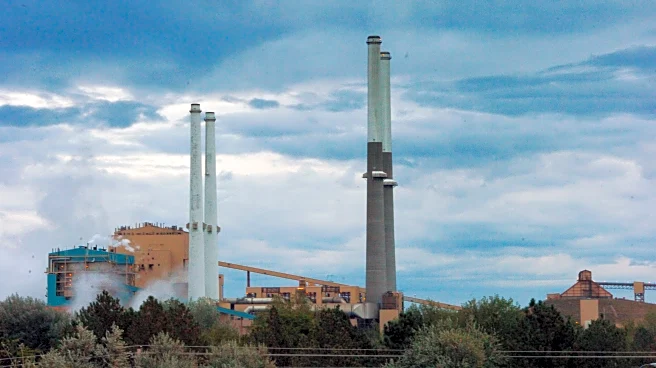What's Happening?
AstraZeneca has announced a $2 billion investment to expand its manufacturing capabilities in Maryland. This initiative includes the expansion of its biologics manufacturing facility in Frederick and the construction
of a new facility in Gaithersburg. The investment aims to support 2,600 jobs, including 300 highly skilled positions, and is part of AstraZeneca's broader $50 billion commitment to medicines manufacturing and research and development. The Frederick facility will nearly double its commercial manufacturing capacity, focusing on biologics used in treatments for cancer, autoimmune, respiratory, and rare diseases. The Gaithersburg facility will be dedicated to clinical manufacturing, supporting the development of innovative molecules for clinical trials. Both facilities are expected to be operational by 2029 and will incorporate advanced technologies such as AI, automation, and data analytics.
Why It's Important?
This investment by AstraZeneca is significant for Maryland's economy and the U.S. medicine supply chain. It strengthens Maryland's position as a leader in the biotech industry and enhances the resilience of the U.S. medicines supply chain. The expansion will accelerate the development and availability of life-saving therapies, particularly in the areas of cancer and rare diseases. By creating thousands of jobs, the investment also contributes to economic growth and provides new opportunities for local communities. AstraZeneca's commitment reflects the importance of onshoring pharmaceutical manufacturing to ensure a stable supply of critical medicines and to foster innovation in the life sciences sector.
What's Next?
AstraZeneca's facilities in Maryland are expected to be fully operational by 2029, with ongoing construction and job creation activities. The company will continue to leverage cutting-edge technologies to enhance its manufacturing processes. As the facilities become operational, AstraZeneca will likely focus on expanding its portfolio of rare disease treatments and increasing the supply of existing medicines. The investment may prompt other pharmaceutical companies to consider similar expansions in the U.S., further strengthening the domestic biotech ecosystem.
Beyond the Headlines
AstraZeneca's investment highlights the growing trend of pharmaceutical companies investing in U.S. manufacturing capabilities to mitigate supply chain risks and enhance innovation. The use of AI and automation in the new facilities represents a shift towards more efficient and sustainable manufacturing practices. This development may also influence regulatory policies, encouraging further investment in domestic manufacturing and research facilities. The focus on rare diseases underscores the increasing importance of personalized medicine and the need for specialized treatments.











